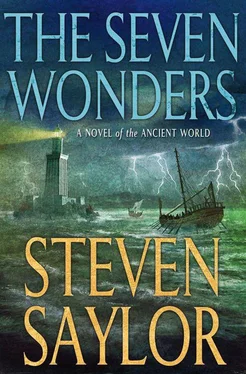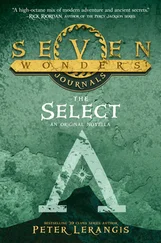Steven Saylor - The Seven Wonders
Здесь есть возможность читать онлайн «Steven Saylor - The Seven Wonders» весь текст электронной книги совершенно бесплатно (целиком полную версию без сокращений). В некоторых случаях можно слушать аудио, скачать через торрент в формате fb2 и присутствует краткое содержание. Год выпуска: 2012, Издательство: Macmillan, Жанр: Исторический детектив, на английском языке. Описание произведения, (предисловие) а так же отзывы посетителей доступны на портале библиотеки ЛибКат.
- Название:The Seven Wonders
- Автор:
- Издательство:Macmillan
- Жанр:
- Год:2012
- ISBN:нет данных
- Рейтинг книги:4 / 5. Голосов: 1
-
Избранное:Добавить в избранное
- Отзывы:
-
Ваша оценка:
- 80
- 1
- 2
- 3
- 4
- 5
The Seven Wonders: краткое содержание, описание и аннотация
Предлагаем к чтению аннотацию, описание, краткое содержание или предисловие (зависит от того, что написал сам автор книги «The Seven Wonders»). Если вы не нашли необходимую информацию о книге — напишите в комментариях, мы постараемся отыскать её.
The Seven Wonders — читать онлайн бесплатно полную книгу (весь текст) целиком
Ниже представлен текст книги, разбитый по страницам. Система сохранения места последней прочитанной страницы, позволяет с удобством читать онлайн бесплатно книгу «The Seven Wonders», без необходимости каждый раз заново искать на чём Вы остановились. Поставьте закладку, и сможете в любой момент перейти на страницу, на которой закончили чтение.
Интервал:
Закладка:
“Come to see the famous Colossus, have you?” he asked. “You won’t regret it. One of the Wonders of the World, that’s for sure. Is it a guided tour you’ll be wanting, or-oh, but it’s you, master Posidonius. Back again, and bringing more guests? Always good to see you. For such a distinguished citizen as yourself, there’s no charge, of course. Here, let me unhitch the rope for you. No Gauls with you this time? My, how those two savages gawked and gaped when they saw our Colossus. Still, your friends are in for quite a treat, especially this young one. You’ll never have seen anything like the Colossus, my boy. Now watch your step out there-be mindful of the rocks and the sharp bits of metal as you go wandering among the ruins.”
Whether he was charging admission or not, the little man kept his hand out as we passed by, and at a sign from Posidonius I saw Zenas produce a small pouch and drop a few coins onto his open palm.
Under a gray sky and with a brisk wind in our faces, we hiked to the end of the mole. Ahead of us loomed a sight that grew ever stranger as we approached-the fragments of the Colossus, which lay in pieces like the body of a warrior hacked asunder. There were a few other visitors on the mole, wandering amid the ruins, and their presence served to show the scale of the statue. The thing was man-made, but so bizarre, so unearthly, that it evoked a kind of religious wonder. Here was a thumb so huge I could barely wrap my arms around it, and here a finger larger than most full-size statues. Here was an arm, lying athwart the mole like a gigantic serpent, and there a torch the size of a lighthouse that must have been held in one of the statue’s hands. Inside some of the fragments I could see the iron bars and hidden bolts that had secured the structure from within; the lower extremities had apparently been filled with stones to act as ballast. In some places the bronze was as thick as my forearm, but in others as thin as a coin.
A thought occurred to me. “With so much of the Colossus intact, why was it not rebuilt after it fell? Could it not have been reassembled?”
“That idea was debated,” said Posidonius. “Some wanted to rebuild the Colossus. Others proposed that the broken statue should be melted down and the bronze reused or sold, for the earthquake had caused considerable damage all over Rhodes, and money and materials were needed for rebuilding. To settle the question, a delegation was sent to Delphi.”
“What did the oracle of Apollo decree?” I asked.
“That the Colossus should never be rebuilt-but also that the pieces should be left where they lay and never be disturbed. As happens so often with oracles, the answer split the difference and satisfied neither party. Yet the wisdom of Apollo is now manifest, for here lies the Colossus two hundred years after it was made, as famous now as when it stood upright, the pride of Rhodes despite its ruined state.”
Rounding a bit of knee, I was suddenly confronted by the statue’s genitalia, a scrotum and phallus surmounted by stylized whorls of hair. In their original context, these parts were no doubt reasonably proportioned, but seen on their own they were rather disconcerting. Antipater laughed aloud at the sight, but he also paused to touch the phallus for good luck. Many others had apparently done the same thing, for the bronze at that spot was shinier than elsewhere.
Farther on we came to the huge face I had seen from the ship the evening we arrived, with its staring eye. Radiating from the sculpted hair atop the head was a crown of sunbeams. Some were bent and some had broken off entirely, but a couple were intact and projected like gigantic spearheads sharpened to a point.
The massive stone pedestal, to which the feet were still attached, was itself as tall as any tenement tower in Rome. At its base, on a huge bronze plaque, inscribed in letters so large they could have been read from ships in the harbor, was a dedicatory poem. Antipater saw me mouthing the words-my skill at reading Greek lagged behind my ability to speak it-and he commenced reciting the lines in a booming voice, with as much conviction as if he had composed the poem himself:
“O Helios, this image we raise to thy renown.
The spoils of battle become thy crown.
The reek of war is pierced by thy light.
With thy blessing we end the fight.
The people of Rhodes stand proud and free.
Dominion is ours on land and sea.”
Posidonius and I applauded the recitation, and Antipater took a bow.
“Now that you’ve seen the remains of the Colossus with your own eyes,” said Posidonius, “can you imagine what it must have looked like when it stood upright?”
I put my hands on my hips and gazed upward, trying to envision the statue looming above me. “It would appear that Helios was naked, except for a scanty cloak draped over one shoulder-you can see folds of his garment amid the bronze ruins, but they can’t have covered much. He stood with one foot a bit forward and the other back, with the knee bent. One arm was lowered, and in that hand he held a torch. The other arm was raised, with the palm open to greet arriving ships.”
“Would you say he was handsome?”
“Well, yes, I suppose-but his nose is rather long. Probably the whole face was a bit elongated, to compensate for foreshortening when seen from below, and the features a bit exaggerated, so as to give the face more character when seen from a great distance.”
“Very good, Gordianus!” said Antipater. “I don’t recall ever teaching you the principles of perspective.”
I shrugged. “It only stands to reason. Or perhaps Chares’ living model simply had a long nose and strong cheekbones.”
Posidonius smiled. “Antipater told me that you’re an unusually observant young man, and so you are. You’ve looked closely at the face, then, and at the rest of the body?”
“I suppose I have.”
“Very good. Try to keep the image of that face in your mind when we return to my house.”
This request seemed unnecessary; having seen the Colossus at close quarters, who could forget it? But to oblige my host, I stared long and hard at the face of the fallen Colossus.
* * *
That evening at dinner, the three of us were joined by Gatamandix. The Druid’s manners were as outlandish as his appearance. Instead of reclining, he insisted on sitting upright to eat, perching on the edge of his dining couch as if it were a chair. He explained that he considered it unnatural for a man to swallow lying on his side. He also had a tendency to speak louder than was necessary, and to do so while chewing his food.
We were also joined by a young Rhodian named Cleobulus, who had escorted the Gauls on their trip to Lindos. Cleobulus was a short, snub-nosed little fellow with mouse-brown hair, and his manners were very prim and proper, in marked contrast to those of the Druid. Posidonius introduced Cleobulus as one of his most outstanding pupils, whose special interest was the history of his native island, about which few men could claim to know more.
The first course, an egg custard with figs, was just being served when we were joined by a final guest, the young Gaul who was traveling with Gatamandix. He made no apology for arriving late, and before he sat down on the dining couch next to the Druid he yawned and stretched, as if he had just awakened from a nap.
“Zoticus, Gordianus, this is Vindovix, of the Segurovi.” Posidonius looked intently at Antipater and me, as if he wished to study our reaction.
Vindovix was certainly a striking young man. His size was his most impressive feature; he was practically a giant. Also notable was his long hair, which was the color of white gold, and quite coarse; later I would learn that he washed it with a lime solution that not only lightened the color but also gave it the texture of a horse’s mane, an affectation much prized by the Gauls. Like Gatamandix, he wore a moustache, though his was not quite as extravagant, reaching only a little past his chin. He had prominent cheekbones, a long nose, and a broad forehead. His eyes were the palest possible shade of blue, like sunlight on the crest of a wave.
Читать дальшеИнтервал:
Закладка:
Похожие книги на «The Seven Wonders»
Представляем Вашему вниманию похожие книги на «The Seven Wonders» списком для выбора. Мы отобрали схожую по названию и смыслу литературу в надежде предоставить читателям больше вариантов отыскать новые, интересные, ещё непрочитанные произведения.
Обсуждение, отзывы о книге «The Seven Wonders» и просто собственные мнения читателей. Оставьте ваши комментарии, напишите, что Вы думаете о произведении, его смысле или главных героях. Укажите что конкретно понравилось, а что нет, и почему Вы так считаете.










